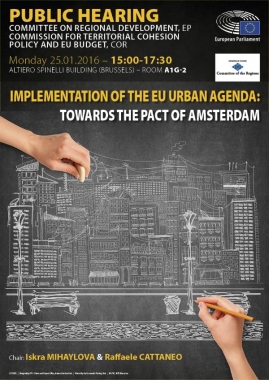Towards the Pact of Amsterdam
Public Hearing on the Implementation of the EU Urban Agenda
Brussels, 27 January 2016 | Published in Urban
On January 25th the European Parliament Committee for Regional Development (REGI) and the Commission for Territorial Cohesion Policy and EU Budget (COTER) of the Committee of the Regions organized a joint Public Hearing on the Implementation of the EU Urban Agenda, the vision of it and the means to make it happen. Housing Europe followed the hearing and reports.
Chairs of both institutional bodies highlighted from the very beginning their common goal of an Urban Agenda in reality. Taking into consideration the fact that until 2030, 80% of EU citizens will be living in cities and 85% of the GDP will be coming from cities, the latter may be held as the true drivers of the EU economy. Therefore, their deeper role in the implementation of the Urban Agenda has to be secured.
The afternoon discussion involved the presence of MEPs, European Commission officials and several stakeholders from different countries, such as University researchers and Policy Advisors. The invitees presented good practices from the UK, Sweden, Croatia and Spain.
Christine Hamza of METIS (a European consultancy offering knowledge-based services in the fields of policy design) pointed out that cross-cutting policies should feed the Agenda. Michael Parkinson (University of Liverpool) stressed that the European Commission should improve contact with cities and to integrate funding packages beyond the Structural Funds.
Jelena Ricov from the Office for EU Programmes and Projects in Zagreb, evoked that the urban poverty and housing crisis are among the roots of the city problems, stressing the fact that 1/4 of the EU population is at risk of social exclusion and poverty. She also referred to the latest "State of Housingin the EU" report by Housing Europe to make the case for importance of the housing cost overburden rate. Until now, no European platform has helped cities address these issues and that the Urban Agenda should serve as such a platform in the future, she concluded.
Read MoreIn response, Mikel Landabaso from DG REGIO of the European Commission confirmed that the Urban Agenda is a policy framework created to develop effective social inclusion, growth and sustainable development. He pointed out that 7 priorities of the Juncker Commission influence the future of cities; therefore the European Commission will closely work with the other Institutions around 12 themes in a framework of partnerships. 4 partnerships have already started and Housing is one of them, while other themes include air quality, poverty, refugees. Housing Europe is a member of the Housing Partnership.
Action Plans will contribute towards better implementation and the Territorial Impact Assessment will help with the monitoring. Structural Funds, Interreg, URBACT and Urban Innovative Actions will all contribute to the territorial cohesion of the EU.
Concluding the discussion participants recalled that the European Commission should propose a concrete structure and policies by 2017 and to this end it needs a strong political will and institutional cooperation.